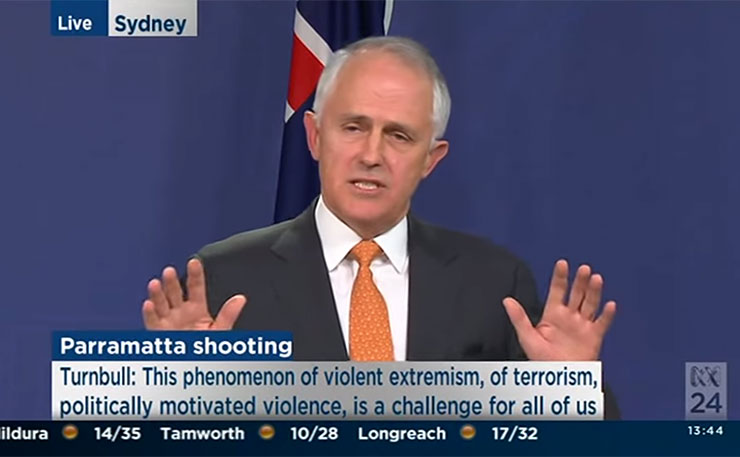The Prime Minister’s recent ‘make you safer’ speech was more about him, less about us, writes Michael Brull.
In a recent speech about the shooting in Parramatta, Prime Minister Malcolm Turnbull informed Australia that, having undertaken extensive consultations, “everything I say about this today is carefully calculated to support the work of our security agencies.”
“Everything” he does is to “make us safe”, he said. Everything, that is, except listening to the less palatable parts of the paper prepared by the Minister Assisting the Prime Minister on Counter-Terrorism.
In particular, I’m referring to his remark that “It is not compulsory to live in Australia, if you find Australian values are, you know, unpalatable, then there’s a big wide world out there and people have got freedom of movement”.
Opposition leader Bill Shorten contributed a more low-brow version of this, announcing “If you really hate Australia, well then you should go”. Parramatta mosque chairman Neil El-Kadomi also got in on the action, saying, “if you don’t like Australia, leave”.
The people who Turnbull invites to leave – those who find Australian values “unpalatable” – are more or less defined in the government paper as radicals.
Radicals “seek to substantially transform the nature of society and government.” This may horrify some, but the paper pointedly defends such intellectual deviants: “Having extreme or radical thoughts is not a problem. Advocacy and legal protest are legitimate ways to seek change in a democratic society, and radical ideas and actions have had a positive impact in Australia’s history.”
It gives as an example the suffragettes. In a Guardian interview, one of the paper’s favoured experts said “thank God for radicals, things like the suffragette movement, anti-slavery, and so on”.
Whilst radicals might hold attitudes which “differ significantly from how most members of society view social issues”, in and of itself, the paper does not demand that such people leave Australia. It argues that, “Radical thoughts are only considered dangerous, and are of concern to the Australian Government and law enforcement agencies, if they justify or promote the use of violence or other illegal activity.”
The paper discusses various ways of dealing with incipient radicals. None of them involve heavy-handed policing, and it only suggests involving the police if harm is threatened. It advocates ideological, social and behavioural responses, which involve things like getting respected leaders to provide guidance, spending time with radicals, and teaching them how to discuss things respectfully.
I suspect this doesn’t include telling those who disagree to go live in another country.
The “most important” thing for family and friends is to “maintain open communication”.
The paper also urges a non-judgmental approach to radicals:
“It is important to listen to and understand an individual’s reasons for becoming involved in violent extremism in order to later assist them. It is also important to make the distinction between their behaviour and who they are as a person. Even if you disagree with what they are saying, it is important that they know they are accepted and supported as a person.”
Insofar as rhetoric can be helpful or harmful in addressing these issues, it appears that it should be quite different to that adopted by the Prime Minister and the Leader of the Opposition.
It’s unlikely any politicians from the major parties will advocate open communication with so-called radicals. That would require a measure of political courage. Instead, they are once again told they are not welcome in Australia. And Muslim leaders are once again pressured to publicly denounce things they have nothing to do with.
There is no evidence that such things contribute to anything positive, other than temporarily reassuring white people. Yet the next time a Muslim does something awful somewhere, there is little doubt similar calls for such denunciations will once again ring across the country.
At this point, I want to remind readers: the paper suggests that “discrimination”, “social unfairness”, and “overseas events that may harm their community” can “push someone onto a path of radicalisation”.
That is, there are matters of domestic and foreign policy that the Federal Government could change to reduce the dangers of radicalisation in Australia. The paper put together by the Minister Assisting the Prime Minister on Counter-Terrorism says so.
Yet change in these areas is politically fraught. The Federal Government could address systemic racism, and change foreign policy to redress grievances held by Muslims in Australia. Or it can engage in empty posturing, issue rhetoric targeted at the Muslim community, increase spending on security forces, pass laws taking away civil liberties, and give more power to police.
Politically, the latter is a lot less risky. This is presumably why it is the option embraced by roughly every Western government whenever the issue arises.
Turnbull can similarly choose the path of rhetoric and posturing. All it would require is ignoring his own Minister’s expert advice on how to address violent extremism in Australia.
It may not make us more safe, but it will be more politically safe. Turnbull inviting people with certain values to leave the country gives us an indication of the path he’s intending to pursue.
Donate To New Matilda
New Matilda is a small, independent media outlet. We survive through reader contributions, and never losing a lawsuit. If you got something from this article, giving something back helps us to continue speaking truth to power. Every little bit counts.




